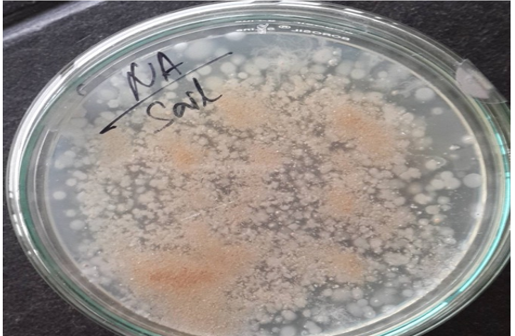Abstract
Silver is a nontoxic, safe inorganic antimicrobial agent used from decades, which has a diverse perspective in the number of biological applications, predominantly in form of nanoparticles. The present study includes synthesis of silver nanoparticles (AgNps) from the bacterium isolated from garden soil samples. The AgNPs were synthesized by reduction of silver nitrate (AgNO3) solution by the bacterium after incubation for 2 days at room temperature. The synthesis of AgNps was initially indicated by the colour change from pale yellow to brown. Further characterization of AgNps was done using UV-visible spectroscopy, Fourier transforms infrared spectroscopy (FTIR) and transmission electron microscopy (TEM). The synthesized AgNPs were found to be spherical in shape and size in the range of 20 nm as demonstrated by TEM. FTIR spectra confirmed the presence of proteins bound to AgNPs act as reducing and stabilizing agent. Antibacterial assay of the synthesized silver nanoparticles was done against MDR (Multidrug resistant) bacteria Enterococcus faecalis by standard NCCLS disc diffusion test. AgNPs were found to have antibacterial activity against Enterococcus faecalis at 100µg/ml concentration of AgNps. Therefore, the antimicrobial activity of the synthesized silver nanoparticles proves the application potential of green synthesis in the area of nano-medicine.
Full text article
Authors

This work is licensed under a Creative Commons Attribution-NonCommercial-NoDerivatives 4.0 International License.

